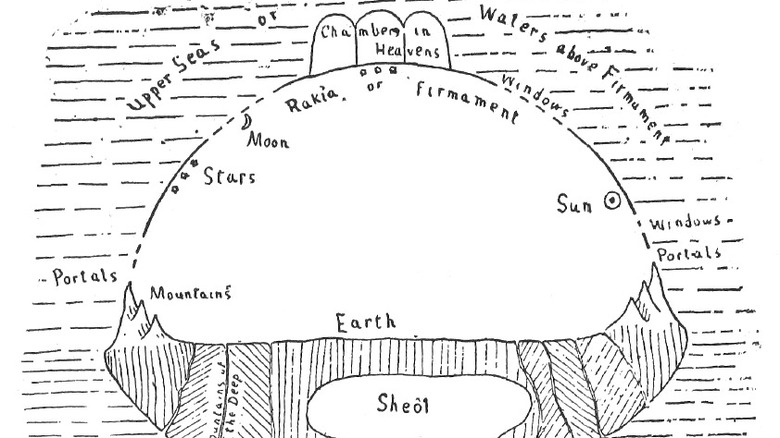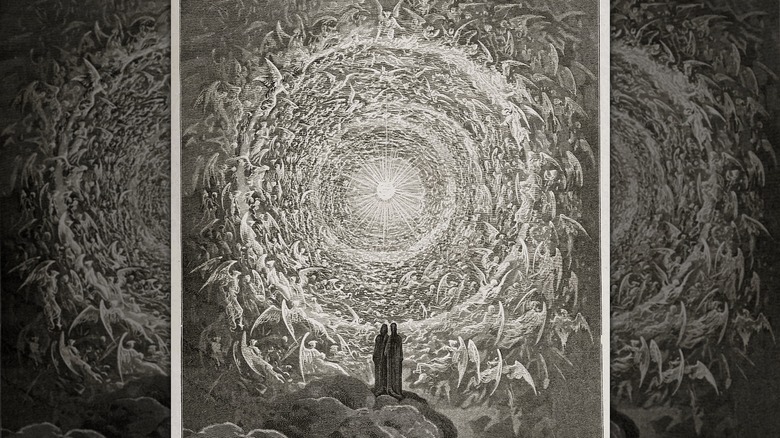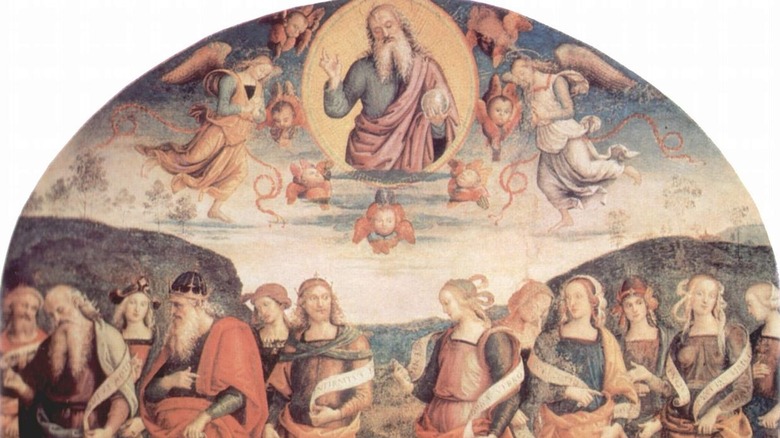The Biggest Unsolved Mysteries About Heaven In The Bible
For many Christians and non-Christians alike "Heaven" is pretty straightforward. You die, you go to a blissful afterlife, maybe you wave at a winged neighbor from across the clouds, and that's it. On the opposite side, there's Hell, the place of endless torment, damnation, fire, pitchforks, etc. But like any bit of theology, "Heaven" didn't sprout up overnight fully formed. It developed over a very long period of time, starting with ancient Hebrew notions of the afterlife and arriving at the present, including centuries of artwork along the way. And the Bible? It doesn't really clarify things too much.
To understand what the Bible says and doesn't say about Heaven, we've got to start with language translations. The word "Heaven" in English comes from Old English by way of Old Norse, "himinn," literally the sky, aka "the heavens." The Bible wasn't translated into English until 1382 C.E., at which time "Heaven" also meant "a heavenly place" or "state of bliss."
The Old Testament, however, was written in Hebrew, and the New Testament in Greek. They use the words "shamayim" and "ouranos," respectively, which also mean sky. All the other facets of "Heaven" — never-ending bliss, angels, a dwelling place for human souls aft, its association with the ascension of the redeemed after the Second Coming, etc. — Those ideas come from separate verses. Tying them together into one concept happened through biblical interpretation over centuries and isn't directly explained in the Bible.
[Featured image by Wolfgang Sauber via Wikimedia Commons | Cropped and scaled | CC BY-SA 4.0]
Where is Heaven?
There's a reason most people envision Heaven as above the Earth, and Hell below it. In a very natural sense, the sky is an unreachable realm where, if gods exist, surely they'd occupy as they oversaw humans below. And where do dead humans go? In the ground. Gods above, death below: easy. In fact, this is precisely the layout defined by Jewish cosmology, which describes our universe as snow globe-shaped.
In Jewish cosmology — from which the concept of a Christian Heaven emerged — Sheol is the murky, gloomy dwelling of the dead below the Earth's surface most commonly translated as "the grave." By contrast, shamayim is the world above, like a dome of water on which the stars, sun, and moon stick. Anytime we read "the heavens," "heaven," or even sometimes "the air" in the Old Testament in English — 422 times total – this is the word used. The Old Testament writers thought of shamayim as "the house of God," as Genesis 28:17 writes.
The New Testament writers – writing in common, Koine Greek – used the word "ouranos" 274 times to mean sky. But as the Ancient Hebrew Research Center says, the New Testament writers used the term euphemistically, as shorthand. They were speaking to a largely Jewish audience and needed to explain their new religion using familiar, Jewish terms. But does this mean that the Bible says that the Christian "Heaven" is in the sky or space? Actually, in Revelation 21 Heaven is described as being on top of a mountain, physically.
[Featured image by Ralph V. Chamberlin via Wikimedia Commons | Cropped and scaled]
What is Heaven?
As The Catholic Register explains, Christians during the first 400 or years after Jesus' death envisioned Heaven as a physical place, often in the sky. In the 5th century C.E. St. Augustine went further and played off the "kingdom" angle by describing Heaven as an orderly, well-governed city where people walked actual streets and saw actual, dead relatives. Verses in the aforementioned Revelations 21 indeed describe Heaven as having "streets of gold," a "great, high wall with twelve gates," walls made of jasper, etc.
The Catholic Register says that it's 13th-century writers like St. Thomas Aquinas who adopted the metaphorical angle when thinking of Heaven, saying that it's a state of being that the soul experiences. The Profession of Faith in The Catechism of the Catholic Church likewise says, "Heaven is the ultimate end and fulfillment of the deepest human longings, the state of supreme, definitive happiness." Living in Heaven is "to be with Christ." Such words summarize the Bible to a degree, but they also extrapolate beyond what biblical text says.
At the same time, Heaven is sometimes envisioned as a beautiful, garden utopia. Luke 23 recounts one crucified thief asking Jesus to remember him in Jesus' "kingdom." Jesus uses the word "paradise" in response, translated from the Greek "paradeisos." This word hearkens back to Adam and Eve's original paradise, which Daily History says took inspiration from actual Babylonian gardens circa the 1st century B.C.E. So what does the Bible say Heaven is? It depends on which verse you read.
Who made Heaven?
The very first verse of the Jewish and Christian Bibles in Genesis 1 says, "In the beginning God created the heavens and the earth" (remember that "heavens" means "shamayin," or sky). So God made Heaven and that's that, right? Not until we step through some very complicated rationalizations regarding age-old confusion surrounding the Trinity: God the Father, God the Son, and God the Holy Spirit.
As the Skeptic's Annotated Bible points out, biblical verses once again say different things about Heaven, in this case about who made it. Old Testament verses like Isaiah 44 repeat Genesis and say, "I am the Lord, the Maker of all things, who stretches out the heavens, who spreads out the earth by myself." But when we add Jesus on top of things — i.e., an incarnate deity who died and also had a soul that went to Heaven to reunite with itself — things become less clear. Speaking of Jesus, Colossians reads, "For in him all things were created." 1 Corinthians 8, however, says, "For us there is one God, the Father, from whom all things are and for whom we exist, and one Lord, Jesus Christ, through whom all things are and through whom we exist."
Yes, that sounds like logic salad. That's why the Christian doctrine of the Trinity didn't come together until 325 C.E. after lots of sectarian disagreement and isn't laid out in the Bible in a clear way. Within the Bible proper, the question of who made Heaven isn't actually resolved.
[Featured image by Gustave Doré via Wikimedia Commons | Cropped and scaled]
Who is in Heaven?
When thinking of Heaven, many people might envision an ever-expanding population of souls increasing in number as people die. But, as the Bible quotes Jesus in John 3:13, "No one has ever gone into heaven except the one who came from heaven — the Son of Man [Jesus]." So does this mean that people who've died aren't in Heaven? Do only post-Jesus people go to Heaven? Such questions have been left to theologians because the Bible isn't clear about them.
In fact, despite what Jesus says in John 3, 2 Kings 2 says, "Elijah went up to heaven in a whirlwind." Genesis 5 also says that God "took him [Enoch] away," meaning that he went to Heaven. In Luke 23, which we mentioned before, Jesus says, "Today you will be with me in paradise," to the crucified thief next to him. But in that case, we come across the aforementioned "paradise" Babylonian garden concept.
Verses like Philippians 1, meanwhile, say, "I desire to depart and be with Christ," implying that death sends a soul straight to Heaven. Paul similarly writes in 2 Corinthians 5 that he "would prefer to be away from the body and at home with the Lord." And yet, these two verses and others aren't explicit enough to mean death equals instant Heaven. This is why some Christians have talked about "soul sleep," especially because Revelations 21 talks about a "new heaven and a new earth" on judgment day, "for the first heaven and the first earth had passed away."
[Featured image by Pietro Perugino via Wikimedia Commons | Cropped and scaled]
When is Heaven?
The book of Revelation — the New Testament's final, apocalyptic book where the damned and the redeemed get separated finally and for good — takes the question "Who is in Heaven?" and combines it with the question, "When is Heaven?" Revelations 20 describes "the dead" being judged according to what they'd done. Bad ones get chucked in the Lake of Fire, while Revelations 21 says good ones go to "a new heaven and a new earth," aka, "the Holy City, the new Jerusalem."
Presumably these dead are souls and not bodies, but it's not actually clear. In Corinthians 1 Paul writes about such doctrinal confusion regarding judgement day and the nature of the afterlife. He rhetorically asks, "How are the dead raised? With what kind of body will they come? How foolish!" A dead person is "sown a natural body," he says, and "raised a spiritual body." He also says, "Listen, I tell you a mystery: We will not all sleep, but we will all be changed."
Riddles aside, these verses all together mean that allegedly dead bodies/souls exist in some temporary, pre-Second Coming setting. This includes Heaven — whatever and wherever it is. Eventually, folks in the current Heaven will get transferred to a new Heaven, i.e., the final and true Heaven. That is if we believe that souls go to Heaven on death, and Heaven isn't only populated now with Enoch, Elijah, and Jesus. But like all other heavenly questions, the Bible leaves these things a mystery.





